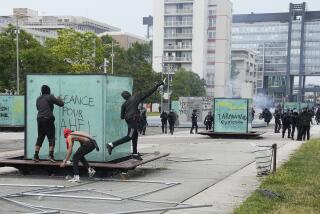Hussein’s Trial Set to Resume as Violence Slows
BAGHDAD — Saddam Hussein is to return to the courtroom as his trial resumes today after a two-week recess, adding another potential irritant after days of sectarian bloodshed in Iraq.
Iraqi authorities decided to press ahead with the trial of the former leader and seven codefendants despite the waves of retaliatory killings and mosque vandalism that swept the country after the bombing last week of one of the Shiites’ most sacred sites. Hussein and his associates are charged with crimes related to reprisals against the Shiite Muslim village of Dujayl.
A four-day curfew was lifted as violence slowed Monday and tempers seemed cooler. A small spot of hope also appeared in the hunt for Jill Carroll, the freelance American journalist who was kidnapped in Baghdad in early January. Her captors had threatened to kill her if their demands were not met by Sunday, but the deadline passed without word.
Iraqi Interior Minister Bayan Jabr said Monday that investigators knew who kidnapped Carroll and that they believed she was still alive.
“We know his name and address, and we are following up on him as [are] the Americans,” Jabr said. “I think she is still alive.”
Sporadic Violence
But worry about civil war still darkened the country, and sporadic attacks and killings flared throughout the day.
Violence and recrimination erupted among Shiites and Sunnis, Iraq’s two main Muslim sects, in the wake of Wednesday’s bombing of the shrine in Samarra, about 60 miles northwest of Baghdad. Shiites, who had largely turned the other cheek after attacks by suspected Sunni Arab insurgents, exploded in rage, killing Sunni clerics and attacking Sunni mosques.
To many Sunni Arabs, Hussein’s trial is a humiliating spectacle with sectarian overtones, and a looming reminder of their loss of power after the March 2003 U.S.-led invasion of Iraq. The defendants and their attorneys are Sunnis, the prosecutor is Shiite and the judge is a Kurd.
“I can understand that there would be concerns as to whether there would be ramifications,” said a trial observer who will be inside the courtroom. “But a court can’t be seen to be responding to political developments.”
Previously, defense lawyers had vowed to boycott the proceedings and the defendants had been represented by a group of court-appointed attorneys. But behind-the-scene negotiations have yielded a face-saving compromise, jurists said.
“There is a request for us to attend the session from our clients, so we will attend,” said Khamis Ubaidi, one of the attorneys leading the defense team.
The court has granted the attorneys the chance to meet with their clients and fulfilled other unspecified requests, lead prosecutor Jaffar Mousawi said. Defense attorneys have been unhappy with the fiery Judge Raouf Rasheed Abdel Rahman, preferring the more gentle courtroom demeanor of Judge Rizgar Mohammed Amin, who resigned from the court last month.
Prosecutors allege that Hussein and the other defendants bear responsibility for the murder, torture and years-long banishment of hundreds of Shiite villagers in an act of retribution following a failed 1982 assassination attempt against the deposed president.
Sunni-Shiite tensions, which festered in relative quiet under Hussein’s harsh leadership, have burst to the surface since the U.S.-led invasion. Many analysts believe these last days have created new depths of resentment and fear.
Families Flee
Nearly 20 Shiite families fled Dujayl-Mashahidah, a predominantly Sunni area north of Baghdad. The Sunni head of the municipality and Sunni clerics tried to dissuade the families, who survived on jobs in a nearby brick factory, from leaving. But their appeals had no effect.
“We have children and we are afraid they might get attacked,” said Ali Hussein Saadi, one of the Shiite fathers. “We decided to stay away for a while. We are trying to avoid trouble.”
Saadi’s family had been living in the area for two decades, he said. He hasn’t been threatened, Saadi said, but he doesn’t feel safe anymore despite the offers of protection and long-standing bonds with his Sunni neighbors.
“Most of the people know us, we attend their celebrations and they pay visits to us, we even have marriages between us,” Saadi said. “By God’s will, when things calm down, we will return to our homes.”
The bloodshed that has already killed more than 200 people since the shrine attack continued. As the sun set, gunfire and explosions crackled in the capital. A homemade bomb went off near a Sunni mosque in Baghdad, killing four worshippers and injuring 18.
The cleric and guard of another Sunni mosque in Baghdad were found dead, according to the television station run by the Sunni Iraqi Islamic Party. The two had been detained by gunmen wearing the uniforms of the Interior Ministry, it said.
Times staff writer Zainab Hussein and special correspondent Asmaa Waguih in Baghdad contributed to this report.
More to Read
Sign up for Essential California
The most important California stories and recommendations in your inbox every morning.
You may occasionally receive promotional content from the Los Angeles Times.










